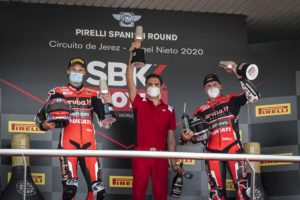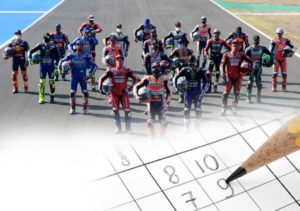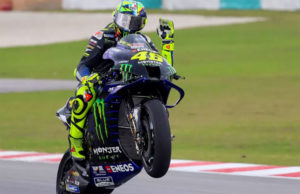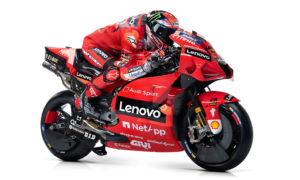Marquez’s absence and the uncertainties arising from a rear tire with sometimes unpredictable behavior and an abnormal calendar due to COVID19 have led many to consider Mir’s title to be of little value or at least accidental due more to a series of causes than to the real merits of the young rider.
With a cold mind then we try to examine mir’s world championship to “weigh” its value compared to the previous 71 titles (1949/2019) of the queen class.
Winning the 2020 MotoGP title, 23-year-old Joan rider Mir made history by becoming the seventh youngest top-class World Champion after Marc Márquez, Freddie Spencer, Casey Stoner, Mike Hailwood, John Surtees and Valentino Rossi, a beautiful company, and at the same time brought suzuki the first MotoGP title after 16 years of participation of hamamatsu’s company at the world championship in the 4-hour era (from 2002 to 2011 with the GSV-R V engine and from 2015 to 2020 with the GSX-R engine in line).
Mir also set rider not-so-exhilarating record as the first rider in the history of the Grand Prix motorcycle racing championship graduated queen class World Champion with only one victory, almost risking becoming the first rider to win the top class title without winning a single race. rider
Remember that in the 2020 Championship riders won more than him: Morbidelli and Quartaro 3 victories, Oliveira 2, but it is also true that, like him, binder, Dovizioso, Petrucci, Rins and Vinales also won only one Grand Prix; but he made a difference, in practice, as is well known, he won for his regularity and constancy of results.
That’s probably why his final scoring average is the second lowest in 72 years of queen class grand prix. In the 14 games played, the 23-year-old Spaniard scored 171 points out of a total available of 350, less than half for a percentage of just 48.85%.
Only one other champion of the queen class won the title by scoring less than half of the points available, Umberto Masetti who in 1952 with the Gilera 500/4 graduated iridate champion with just 43.75% of the maximum points.
Can we say that there are similarities between the 1952 championship won by Masetti and mir’s 2020 championship?
No, we believe that it is impossible because in 70 years the scenario of the MotoGP has totally changed from all points of view: reliability of mechanical vehicles, number of calendar Grand Prix, layout and safety of the tracks, evolution of the mechanical vehicle, number of contenders riders constructors).
In masetti’s favor we must say that at the time the breaks of the mechanical vehicle were not a rare event, safety was a very relative concept so that the consequences of falls were often lethal or even fatal, the small number of Grand Prix (eight, in 1952) that did not facilitate a recovery in case of absence in one or two GPs , which probably justified the adoption of the discard rule (but it is also true that the greater interval between one GP and the next allowed a greater possibility of physical recovery).
On safety, just remember that while in MotoGP there has not been a fatal event for nine riders years, when we lost Simoncelli, in 1952 alone three riders of the 500 died: Dave Bennett at the Swiss GP (Bremgarten), Frank Fry at TT and Norman Stewart at the Ulster GP (Clady).
At the top of this ranking we find only riders who have become Champions by winning all the races on the agenda, thus winning 100% of the available points: Surtees and Agostini.
Surtees was the first when in 1959 with the MV Agusta he won all seven Grand Prix on the agenda, an impressive result although objectively favored by riders the fact that he had as teammate Remo Venturi, certainly less talented than the “son of the wind” and as riders opponents riding the less performing Norton and Matchless single-cylinder.
The feat was repeated in 1968 Giacomo Agostini, also driving an MV Agusta, who won all ten Grand Prix not having even a teammate to compare with.
But, regardless of the value of the competition, both performances were extraordinary because at that time the rider Grand Prix bikes were quite unreliable, so it was up to the sensitivity of the rider to bring them to the finish line (these were the times when Enzo Ferrari said: “The perfect race car is the one that breaks a moment after the finish line”).
It is also true that both had a lot of means at their disposal that made Count Agusta available to them; just think that the technical director, the great and unforgotten Arturo Magni, when there was no time between races to return to the venue, could use Count Domenico’s private plane to bring the engines back to the workshop, regenerate them and then fly to the headquarters of the next Grand Prix.
No rider repeated the feat; Doohan alone came close to making 90.57% in 1994 and 90.67% in 1997.
In this special ranking follow two greats of our times: Valentino Rossi who, getting on the podium in all 16 races of 2003, made an excellent 89.25% and Marc Marquez who got 88.42% in 2019, a figure “dirty” from the only withdrawal in Austin, when he was at the head of the race, moreover due to technical reasons.
In the order of 80%, an exceptional performance, it is no coincidence that we find prestigious names such as
those of Mike Hailwood,
Freddie Spencer, Wayne Rainey, Eddie Lawson,
Casey Stoner,
Jorge Lorenzo.
At the bottom of the value scale with about 50% we find Nicky Hayden, Franco Uncini, Les Graham and Barry Sheene (1976). A good company for Mir who has achieved, as we have seen, a percentage close to 50%.
We wanted to remember in particular the vintage of Sheene (it went better in 1977) because this poor performance is justified by the fact that he did not participate in the TT considered excessively dangerous and not even in the last three races because he had already secured the title (at the time it was “allowed”). Hayden, on the other hand, can remember that he was one of riders to win the title with only two victories.
Mir, ultimately, regardless of the numbers, has shown maturity, intelligence, ability to evaluate the means at its disposal, ability to manage tire wear, effectiveness in overtaking (thus limiting the handicap of almost never brilliant qualifications).
Is it, then, an undeserved or at least fortuitous title?
Perhaps the answer must be found in the axiom that “a world title never comes by accident”.
And if, however, someone wanted to give the credit of this title more to the luck rider than to his merits, I want once again to quote Enzo Ferrari when with one of his famous paradoxes he said “Better a rider than a good one …”.

SBK a Jerez: avanti tutta!
A Jerez de la Frontera, seconda tappa del campionato SBK, si ri-accende lo spettacolo con Ducati protagonista. Doppietta di Redding e secondo posto in gara 2 per Davies.

Le pagelle del mondiale MotoGp 2020
Le pagelle del campionato MotoGp 2020, i voti ai piloti che hanno partecipato a questo pazzo, pazzo mondiale.


